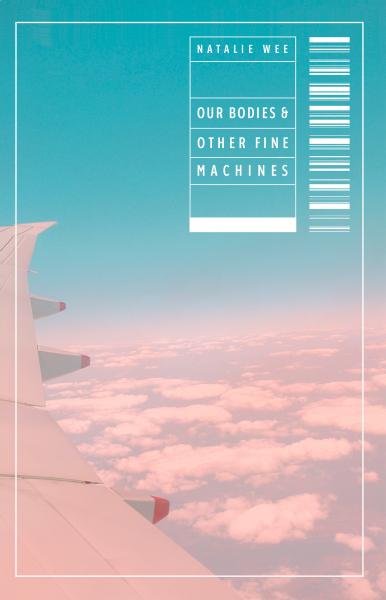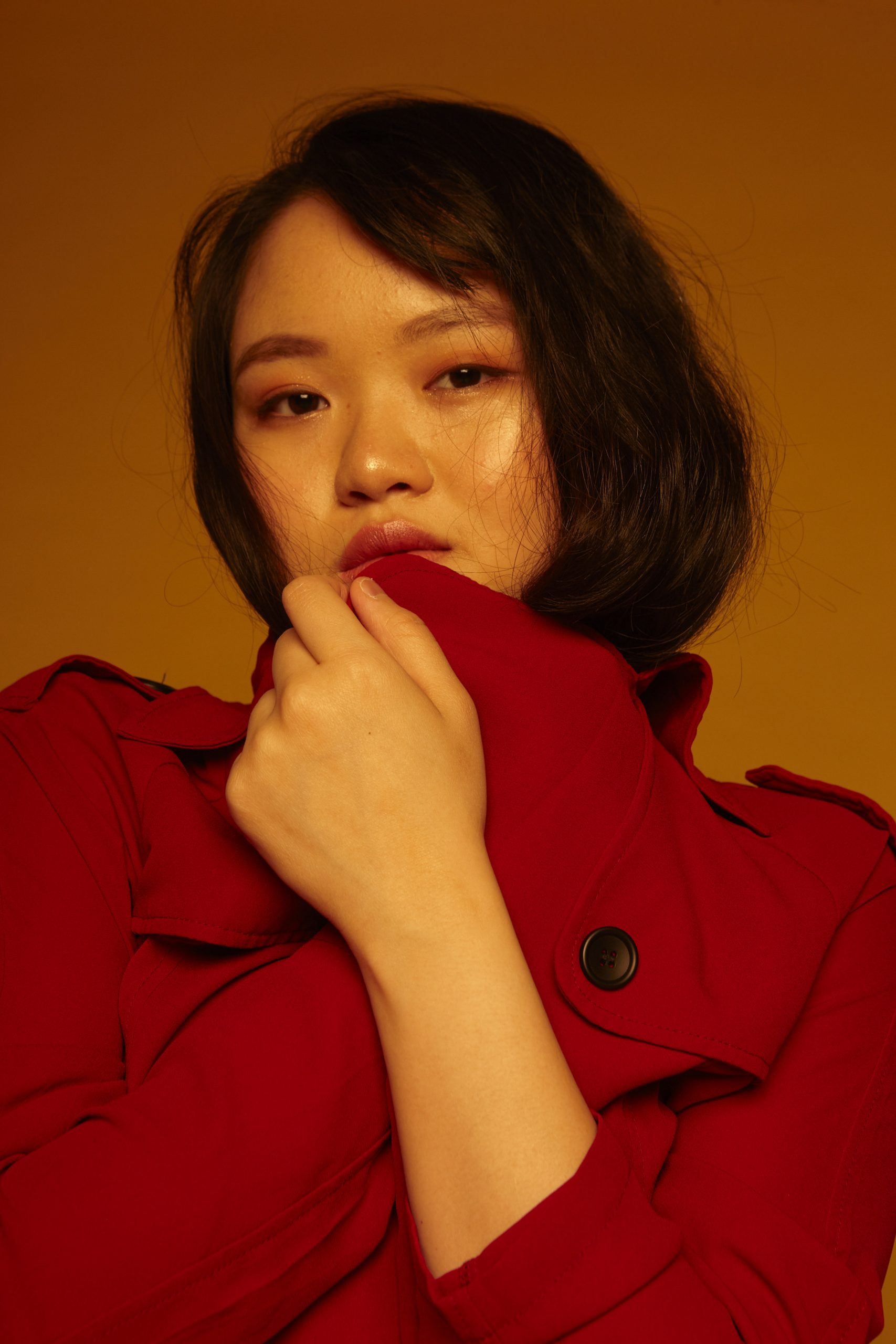Natalie Wee is the author of Our Bodies & Other Fine Machines (Words Dance Publishing, 2016). Her first book is now available at Amazon and on Goodreads. Room’s Chelene Knight spoke with her about her putting together her first book, and her experience publishing in both the US and in Canada.
Natalie Wee is the author of Our Bodies & Other Fine Machines (Words Dance Publishing, 2016). Her first book is now available at Amazon and on Goodreads.
Learn more about Natalie via her website.
Room’s Chelene Knight spoke with her about her putting together her first book, and her experience publishing in both the US and in Canada.
Chelene Knight (CK): I had the pleasure of reading your manuscript Our Bodies and Other Fine Machines. What can you tell us about the building of this manuscript? What about the construction, the threading? How did it come to be?
Natalie Wee (NW): Our Bodies & Other Fine Machines explores the possibilities of the self from the perspective of a queer, immigrant woman of colour. This project was an attempt to make sense of how I related to myself, as well as the ways in which the marginalized have had to make sense of their own identities.
Initially, I struggled with putting it together—the manuscript read like a collection of loosely grouped poems with similar themes. It was Ocean Vuong’s Night Sky with Exit Wounds that gave me the idea of using segmentation in a poetry book, and I decided to run with the idea. As I worked on segmenting the manuscript, I came to realize I wanted the experience of reading the book to mirror the progression of understanding oneself. Once I realized that was the aesthetic experience I wanted to create, it was easier to order the poems in a way that made the reading process a movement towards psychic closure.
CK: I can relate to what you said about poems in a new manuscript feeling “loosely grouped” as this happened to me with my first book. Finding the threads is like an epiphany right? How did you feel when you “figured” it all out?
NW: I don’t know if it feels any different from the rest of the creative process! Like any endeavour at self-exploration, the feeling of satisfaction usually arises when you’re aware of how much better your senses are than they once were. For me, the process of working on poems is the emotional high, and the state of having “figured” something out is often just a stop-gap between a project’s current state and when I next “figure” something out.
CK: As a poet myself, I take a big interest in piecing together fragments in my own writing to create poems. How do you sit down and begin a piece? What is your writerly routine? What prompts you to start?
NW: I think it’s hard to say how the process of creation goes. Sometimes it’s a phrase that captures my attention, and I use that to create a larger work. Often, it’s a sensation inspired by a piece of music, or a film, or even the way something looks in the right light, that I’m trying to make sense of through language. It’s often the attempt to understand an experience—that search for internal coherency—that kicks off my creative process. What results from that is anyone’s guess.
CK: We all have a writing style that we notice in other writing that we try to infuse into our own. What would you say your “style” is? Who inspires/influences you?
NW: I would say my style is disruptive of convention. I like enjambment, hyphens, and breakages in words that suggest different possible readings of the resultant fragments. I’m also trying to deal with poetry not only as words on a page, but words interacting with the space around it.
I have a long list of poets I love, including Franny Choi, Chen Chen, Rumi, and Vivek Shraya, but the single greatest literary inspiration in my life has to be Ocean Vuong. He is someone I have a lot of love for, not just as a poetic ancestor, but as another queer Asian immigrant. I opened the book with a quote from his work, “Someday I’ll Love Ocean Vuong”, because it was this very poem that first allowed me to realize that I could arrange my experiences in a way understood to be poetry, and in the process, convince someone else to stay alive.
CK: What other genres can do what poetry does? In my opinion, none. But I often look for poetic fiction or genre-bending prose. What do you think about hybrid genres?
NW: I think hybrid genres are amazing. I like to think of cultural and artistic works as immersive aesthetic experiences, and if something arises from culture, I don’t think it really makes sense to demarcate what aspect of culture it can speak back to. Film is a hybrid genre that became large enough to be classified on its own, but when you think about it, films are just textual narrations embodied through visual language, and affected by an auditory ambience. Similarly, I think that anyone attempting to work with hybrid genres goes through a process of supplementing one genre’s characteristic strengths to whatever they’re working on. Anyone who works on hybrid genres has my full admiration.
CK: As an emerging writer who’s working with a Canadian publisher for one project and an American publisher for another, what would you say are the benefits of publishing in the US? What has your experience been like?
 NW: I would say it’s been a really interesting journey, publishing in the USA while having never been there myself. It has complicated parts of a regular publishing deal, like author tours or book launches. Just because American literature is talked about so much more often than Canadian literature, it was easier for me to gain knowledge of who to approach and how to approach them, as well as the issues to look out for in publishing,
NW: I would say it’s been a really interesting journey, publishing in the USA while having never been there myself. It has complicated parts of a regular publishing deal, like author tours or book launches. Just because American literature is talked about so much more often than Canadian literature, it was easier for me to gain knowledge of who to approach and how to approach them, as well as the issues to look out for in publishing,
Because Words Dance Publishing is such a small press, I’ve been able to be more hands-on in various aspects such as book design and publicity. On a more personal note, I’ve been extremely fortunate to work with small publishers who are beautiful people on top of their incredible commitment to literature. Every day has been an adventure.
CK: What are your hopes for Our Bodies and Other Fine Machines? What work do you see your book doing for us? What do you hope to “school” us on? What do you want us to know?
NW: Because literature is still an incredibly white space, and the traditional literary canon is comprised of a largely homogenous group, engaging with cultural or artistic texts can be really alienating to anyone who isn’t a straight white man. I want my presence to interrogate the conventions of what ‘good’ literature is, and I hope to build upon the multiplicity of voices creating access points between a colonial language and experiences of minorities.
My work has always been for the Othered. My initial goal in working with both a Canadian and American publisher was to create pathways in dominant North American literary markets for immigrant minorities like myself. In light of the current political situation in the USA and the growing social tension here in Canada, I hope my presence and work reminds other marginalized groups of what we can survive, and that we have to survive.
CK: If you could give any one piece of advice you an emerging poet with a manuscript to help them take that next step into this competitive publishing world, what would it be?
NW: As a child, I read an article where an artist said that the mind will always be five years ahead of what the hands can do. As creative people, we’re constantly struggling with sensations of inferiority, but this sense of inadequacy arises precisely because we sense the gap between what we’re doing now and what we’re capable of doing. It’s that ability to recognize how much further we have to go that will take us there. It’s difficult, but creating work is integral in the process of trying to outdo yourself. You’re already five years better at your craft than you were five years ago. So keep creating.
Photo credit: May Truong














